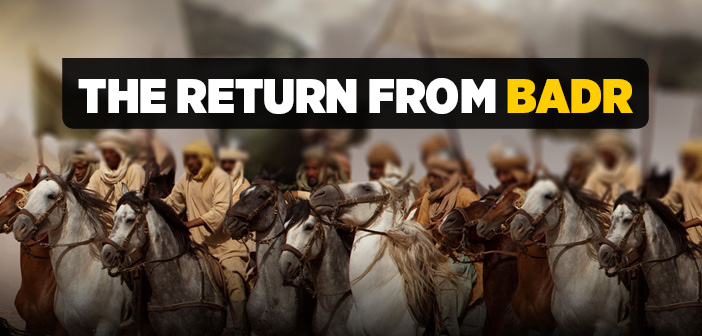What is year of envoys?
Mecca had been taken, the Battle of Hunayn had been won, the people of Taif had become Muslim a year after the siege and the troublesome campaign of Tabuk recently undertaken had been concluded triumphantly. There was no longer any obstacle in the entire Arabian Peninsula that could stand in the way of Islam. Tribes in Arabia, who thereby enjoyed the opportunity of gaining a more intimate knowledge of Islam, began sending envoys to the Blessed Prophet -upon him blessings and peace- to pledge their allegiance. These envoys, arriving from Yemen, Hadramawt, Bahrain, Amman, the borders of Syria and Persia, were either coming to become Muslim in the presence of the Blessed Prophet -upon him blessings and peace- or to inform him they had already done so, and to ask from the Prophet of Allah -upon him blessings and peace- teachers who could teach them Islam.
A brilliant example of a tribe to immediately return to their people to convey what they had personally learned from the Blessed Prophet -upon him blessings and peace- is Banu Tujib. A thirteen man envoy of the tribe arrived next to the Noble Messenger -upon him blessings and peace-, with their alms to pay. The Prophet of Allah -upon him blessings and peace- became fond of their overall manner and after warmly welcoming them, told Bilal Habashi -Allah be well-pleased with him- to host them in the best way possible.
“We have brought to you, Messenger of Allah, what is Allah’s due in our wealth!”
“Take them back with you and distribute it among your poor”, said the Blessed Prophet -upon him blessings and peace-.
“But we have only brought with us what was left over from our poor”, they explained.
Abu Bakr -Allah be well-pleased with him- then praised them, commenting, “Surely there is not any other envoy among other Arabs like these men of Tujib, Messenger of Allah!”
“Guidance is in the hands of Allah”, then stated the Noble Prophet -upon him blessings and peace-. “Allah opens to iman the hearts of whom He wishes for the best.”
The envoy of Banu Tajib asked the Blessed Prophet -upon him blessings and peace- certain questions about the Quran and Sunnah. Their answers were written down and handed to them. Their enthusiasm increased the Prophet’s -upon him blessings and peace- interest towards them. After staying a few days, the envoy expressed their desire to return. When asked as to why they were in such a hurry, they said, “We want to return to our people as soon as possible so we can teach them what we saw and learnt of the Messenger of Allah!” They saw the Prophet of Allah -upon him blessings and peace- one last time and bode him farewell. The Prophet -upon him blessings and peace- sent Bilal Habashi -Allah be well-pleased with him- with them and granted them more gifts than any other envoy. (Ibn Saad, I, 323; Ibn Qayyim, III, 650-651)
Requiring the incoming envoys to stay in Medina for a certain period of time, the Blessed Prophet -upon him blessings and peace- thereby made sure they learnt the Quran and the basics of Islam, giving them a grasp of the religion in practice by having them see how he himself applied its principles. For instance, when an envoy from the Abd’ul-Qays tribe arrived, he asked the Ansar to host them and see to their needs while they were in Medina, meanwhile telling them to teach their guests the basics of Islam and have them memmorize enough chapters of the Quran for them to be able to offer their salat. The next morning at fajr salat, the Prophet of Allah -upon him blessings and peace- then asked how they were doing and whether they were happy with how their hosts had been attending to them. Seeing they were more than pleased, he then distributed them, in pairs, among the Companions, to give them an opportunity to learn Islam more sufficiently and comfortably. Satisfied with the efforts of his Companions and the eagerness of the Abd’ul-Qays envoy, he then attended to each of the new Muslims, one by one, and personally listened to them recite what they had commited to memory and corrected their mistakes, if they had any.[1]
In this way, Islam spread across entire Arabia and grew by the day. People were arriving in masses to enter Islam and Medina was filled to capacity, each day, with new guests. The Prophet of Allah -upon him blessings and peace- was welcoming them in the most compassionate manner, treating them with honor and kindness, conversing with them in line with their own conditions and dispositions, gathering information about their regions, listening to their needs and solving their problems, and in short, embroidering the pattern of the joy and peace of Islam onto their hearts.[2]
Troubles of old had now cleared the way for a blessing abundant. Allah, glory unto Him, urged His Messenger and the entire Believers, who had born the brunt of years of torment, to show their indebtedness towards this generous blessing He granted them:
“When there comes the help of Allah and the victory; and you see men entering the religion of Allah in companies. Then celebrate the praise of your Lord, and ask His forgiveness; surely He is oft-returning (to mercy).” (an-Nasr, 1-3)
Owing to the rapid spread of Islam in Arabia and the arrival of envoys of various tribes in Medina in masses to learn the religion of Truth, the ninth year of Hegira has come to be known as the Year of Envoys.
[1] Ahmad, III, 402.
[2] See, Nasaî, Umrah, 5.
Source: Osman Nuri Topbaş, The Prophet Muhammed Mustafa the Elect II, Erkam Publications





